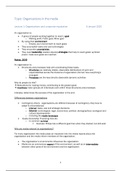Samenvatting
Summary All lectures Organisations in the Media
- Instelling
- Universiteit Van Amsterdam (UvA)
All lectures from the topic Organisations in the media; includes all literature and material discussed in the lectures. Articles mentioned with a star (*) means that the article was obligatory material.
[Meer zien]




